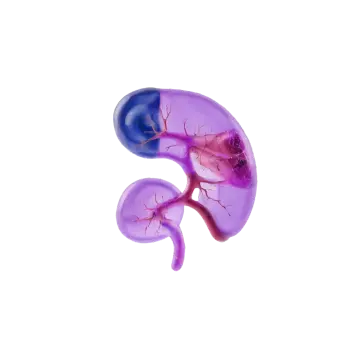What is kidney failure?
Kidney failure occurs when the kidneys can no longer perform their normal filtering function, leading to a buildup of waste products in the body. There are two main types of kidney failure:
- Acute kidney failure: A sudden loss of kidney function that can occur within days or weeks. It can be caused by injury, infection, or blockage in the urinary tract, and it is often a condition that can recover if treated early.
- Chronic kidney failure: Kidney function gradually deteriorates over time, and kidney failure develops slowly, often as a result of long-term diseases such as diabetes, high blood pressure, or chronic kidney diseases.
Common symptoms of kidney failure
The onset of symptoms of kidney failure can vary depending on whether it is acute or chronic. Here are some common symptoms:
- Fatigue and general weakness due to the accumulation of waste products and a reduced ability to produce red blood cells.
- Swelling in the legs, feet, and ankles caused by fluid retention.
- Foamy urine, which may indicate the presence of protein that the body cannot filter out properly.
- Dull ache or pain in the lower back or sides, sometimes interpreted as "pain in the kidneys."
- Changes in urination patterns, such as decreased urine output, darker urine, or the need to urinate more frequently, especially at night.
- Loss of appetite and nausea, which can lead to unintentional weight loss.
- Difficulty concentrating and mental sluggishness due to imbalances in electrolytes and toxins affecting the brain.
Symptoms of kidney failure in women
Kidney failure can affect women differently than men. In addition to common symptoms, women may also experience:
- Decreased sex drive and changes in the menstrual cycle due to hormonal imbalances.
- Difficulty becoming pregnant, as the kidneys are central to maintaining hormonal balance in the body.
Kidney failure and alcohol
Alcohol abuse is a potential risk factor for developing kidney failure. Alcohol can cause dehydration and increase blood pressure, which over time can damage the kidneys. In people who already have reduced kidney function, alcohol can worsen symptoms and contribute to faster deterioration of the kidneys.
Why does kidney failure occur?
Kidney failure can be caused by a variety of factors; here are a few of them:
- Diabetes: High blood sugar levels can damage the small blood vessels in the kidneys, affecting their filtering ability.
- High blood pressure: Prolonged high blood pressure can strain the kidneys and damage their function.
- Infections or blockages in the urinary tract can lead to acute kidney failure if not treated in time.
- Medications such as NSAIDs (non-steroidal anti-inflammatory drugs) can also contribute to kidney damage when taken in high doses over a long period.
How is kidney failure treated?
Depending on the severity and underlying cause, kidney failure is treated with various options:
- Medications to control blood pressure, blood sugar levels, and relieve symptoms like swelling.
- Dialysis, a treatment where a machine performs the kidneys' filtering function, may be necessary in severe kidney failure.
- Kidney transplantation can be an option for people with chronic kidney failure when other treatments are not effective.
How long can one live with kidney failure?
The prognosis for people with kidney failure depends on the degree of kidney damage and how early the condition is treated. With early diagnosis and proper treatment, many can live a relatively normal life, even if they have to adjust their lifestyle. People undergoing dialysis or kidney transplantation can live for many years, although chronic kidney failure entails significant lifestyle changes.
Early identification of symptoms and seeking medical care are crucial to prevent serious complications. If you experience symptoms of kidney failure, it is important to consult a doctor for evaluation and treatment.
A good way to gain insight into your kidney function is to take a blood test that measures important kidney markers such as eGFR (cystatin C) and creatinine. Learn more about these markers in our kidney function test, Kidney Check.





















